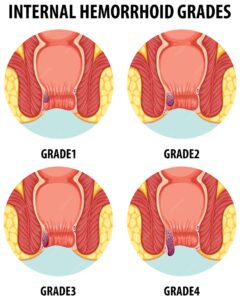Piles (Hemorrhoids)

Definition of Piles (Hemorrhoids)
Piles, medically known as hemorrhoids, are swollen, inflamed veins located in the lower rectum or
around the anus. They are similar to varicose veins and develop due to increased pressure in the
anal or rectal region.
They can be internal (inside the rectum) or external (around the anus), and depending on their size
and severity, they can cause pain, bleeding, and difficulty during bowel movements
Causes of Piles
Several factors contribute to the development of piles:
• Chronic Constipation
• Chronic Diarrhea
• Prolonged Sitting
• Low-Fiber Diet
• Obesity
• Pregnancy
• Aging
• Genetic Factors
• Heavy Lifting
Symptoms of Piles
• Painless rectal bleeding (bright red blood)
• Pain or discomfort
• Itching or irritation
• Swelling or lump near anus
• Feeling of incomplete bowel evacuation
• Mucus discharge
• Thrombosed hemorrhoid – extremely painful with hard lump
Types of Piles
Internal Piles: Occur inside rectum, usually painless but may bleed.
External Piles: Develop around anus under the skin, can be itchy, painful, and may bleed.
Thrombosed Piles: A blood clot forms, causes severe pain, swelling, bluish discoloration.
Grades of Internal Piles
| Grade | Description |
| Grade I | No prolapse. Bleeding may be present. |
| Grade II | Prolapse occurs during straining but returns spontaneously. |
| Grade III | Prolapse during straining; needs manual reduction |
| Grade IV | Prolapsed permanently; cannot be manually reduced; may be painful |

Ksharasutra Therapy (Ayurvedic Treatment for Piles)
Ksharasutra is an ancient Ayurvedic para-surgical procedure used to treat piles, fistula, and other
anorectal disorders. It involves tying a medicated thread around the base of the pile mass.
Herbs Used in Ksharasutra Preparation:
Apamarga Kshara, Snuhi latex, Haridra
Procedure:
• Diagnosis & Preparation
• Anesthesia
• Application of Ksharasutra
• Weekly Thread Changes
• Healing
Benefits of Ksharasutra Treatment
✔Minimally invasive
✔Very low recurrence rate
✔Safe and effective
✔Outpatient procedure
✔Simultaneous cutting and healing
✔Less bleeding and pain
✔Cost-effective
Post-Therapy Care (After Ksharasutra Treatment)
• High-fiber diet, 2.5–3 liters water daily
• Sitz baths 2–3 times daily
• Medications as prescribed
• Weekly follow-up
• Avoid straining, prolonged sitting, heavy lifting
Precautions After Ksharasutra Therapy
Maintain regular bowel habit
Perform light exercise
Avoid alcohol & smoking
Do not delay going to the toilet
Continue Ayurvedic medicines if advised
Report excessive bleeding, severe pain, or pus to doctor
